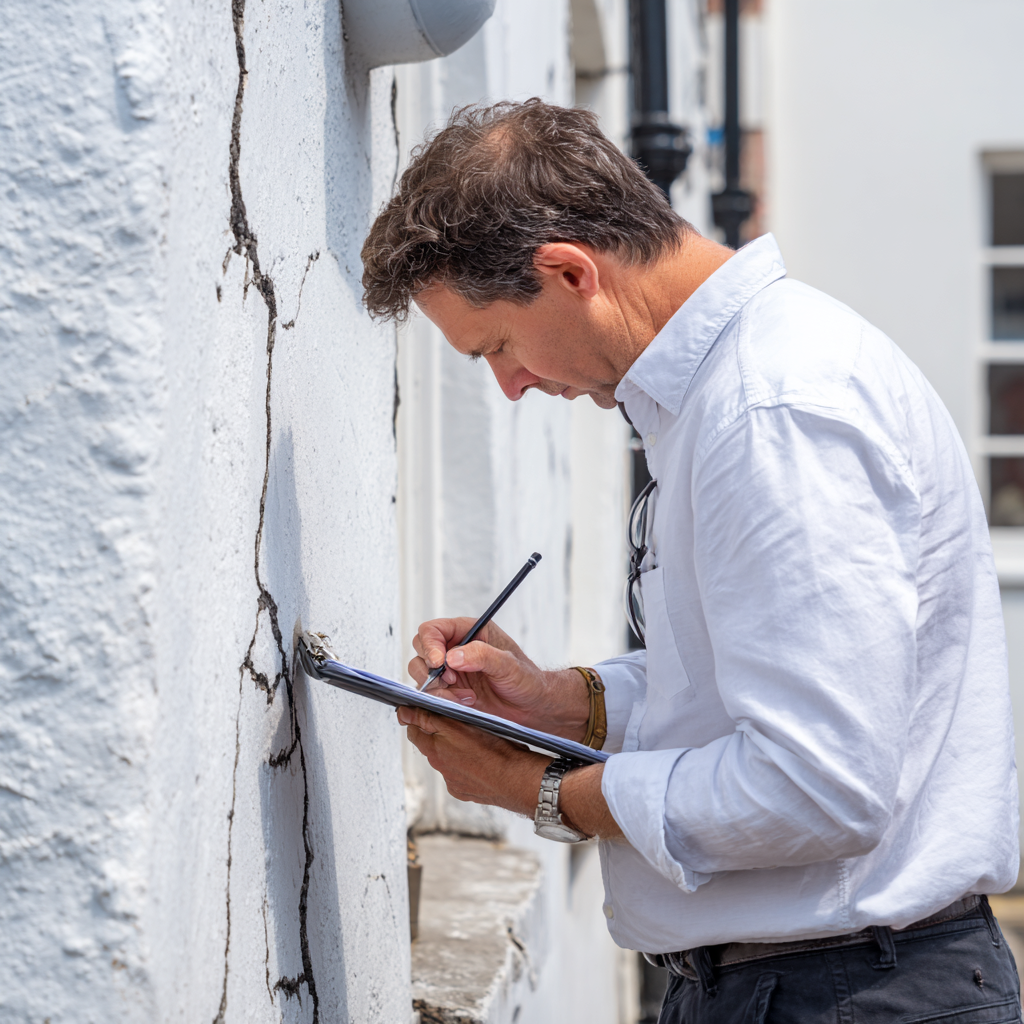What does a party wall surveyor do?
This post continues our series explaining the different professional roles involved in a residential building project. A party wall surveyor is an independent specialist who ensures that work affecting shared or neighbouring structures is carried out lawfully and without causing unnecessary disputes. Their role is defined under the Party Wall etc. Act 1996, which protects the rights of both property owners when building work takes place near or on a shared boundary.
In essence, a party wall surveyor acts as a referee between neighbours. They review the proposed works, assess how these might affect adjoining buildings, and formalise agreements (known as “awards”) setting out how the work should proceed. These awards include drawings, schedules, and conditions designed to protect both sides.
Party wall surveyors are not there to prevent work but to make sure it is done safely and fairly, in accordance with the Act.
A party wall surveyor undertaking a Schedule of Condition
When a party wall surveyor is required
Party wall surveyors are typically needed for terraced and semi-detached homes, where boundaries and shared walls are common. Detached houses are less likely to require one, though excavation close to a neighbour’s foundations can still trigger the need.
Under the Party Wall Act, a notice must be served if you plan to:
Excavate within three metres of a neighbour’s structure and deeper than their foundations, or within six metres if the excavation falls within a 45-degree line drawn from the bottom of their foundations
Cut into or alter a shared (party) wall, such as when inserting steel beams or damp proof courses
Build on or astride a boundary line, such as when constructing an extension wall directly up to or along a garden boundary
Because the definition of “party wall” extends beyond the obvious shared wall, it is best to check with a surveyor if there is any uncertainty. Appointing one early can avoid delay and ensure the correct notices are served.
Nancy Gouldstone Architects advises clients whenever a party wall surveyor is likely to be required, usually at the point when structural design is being developed. The practice can also recommend trusted surveyors who are experienced in working on high-quality residential projects.
The party wall process
Once it is confirmed that the Act applies, the process usually follows these steps:
Serving notices
The surveyor prepares and serves formal party wall notices to each affected neighbour, describing the works and including relevant drawings. These notices must be issued at least one month before excavation works or two months before works directly affecting the wall.Neighbour’s response
Each neighbour has 14 days to respond. They may consent, allowing the work to go ahead without an award, or dissent, meaning an award is required. Even if a neighbour consents, the surveyor may still record a Schedule of Condition to document the state of their property before works begin.Appointment of surveyors
If the neighbour dissents, they can either appoint the same surveyor as the building owner (acting “agreed”) or appoint their own. If two surveyors are appointed, they will jointly prepare the award. The building owner pays both surveyors’ fees in most cases.Schedule of Condition
The surveyor inspects the adjoining property and records its condition through notes and photographs. This protects both sides by providing a clear record before any work begins.The party wall award
The award sets out how and when the work can be carried out. It covers methods of construction, access arrangements, and protection measures for the neighbouring property. Once agreed and served, it becomes legally binding, allowing the project to proceed.
Costs and timing
Fees for party wall surveyors vary depending on the number of neighbours, the complexity of the works, and whether one or two surveyors are involved. All surveyor fees are normally paid by the building owner undertaking the works.
Because notices must be served well before construction, it is sensible to involve a surveyor as soon as the structural design is known, usually around the technical design stage. This ensures the process runs in parallel with design development and does not hold up the start on site.
Why the role matters
Party wall surveyors help maintain good neighbour relations and protect against later disputes. Their records and awards form a clear, impartial framework that ensures both parties are treated fairly. For the building owner, it provides the legal right to proceed once agreements are in place; for the neighbour, it guarantees that their property will be monitored and safeguarded.
In London, where many homes share walls or sit close together, party wall agreements are a routine and necessary part of the construction process. By engaging an experienced party wall surveyor early, clients can ensure their project proceeds lawfully, smoothly, and with peace of mind.

